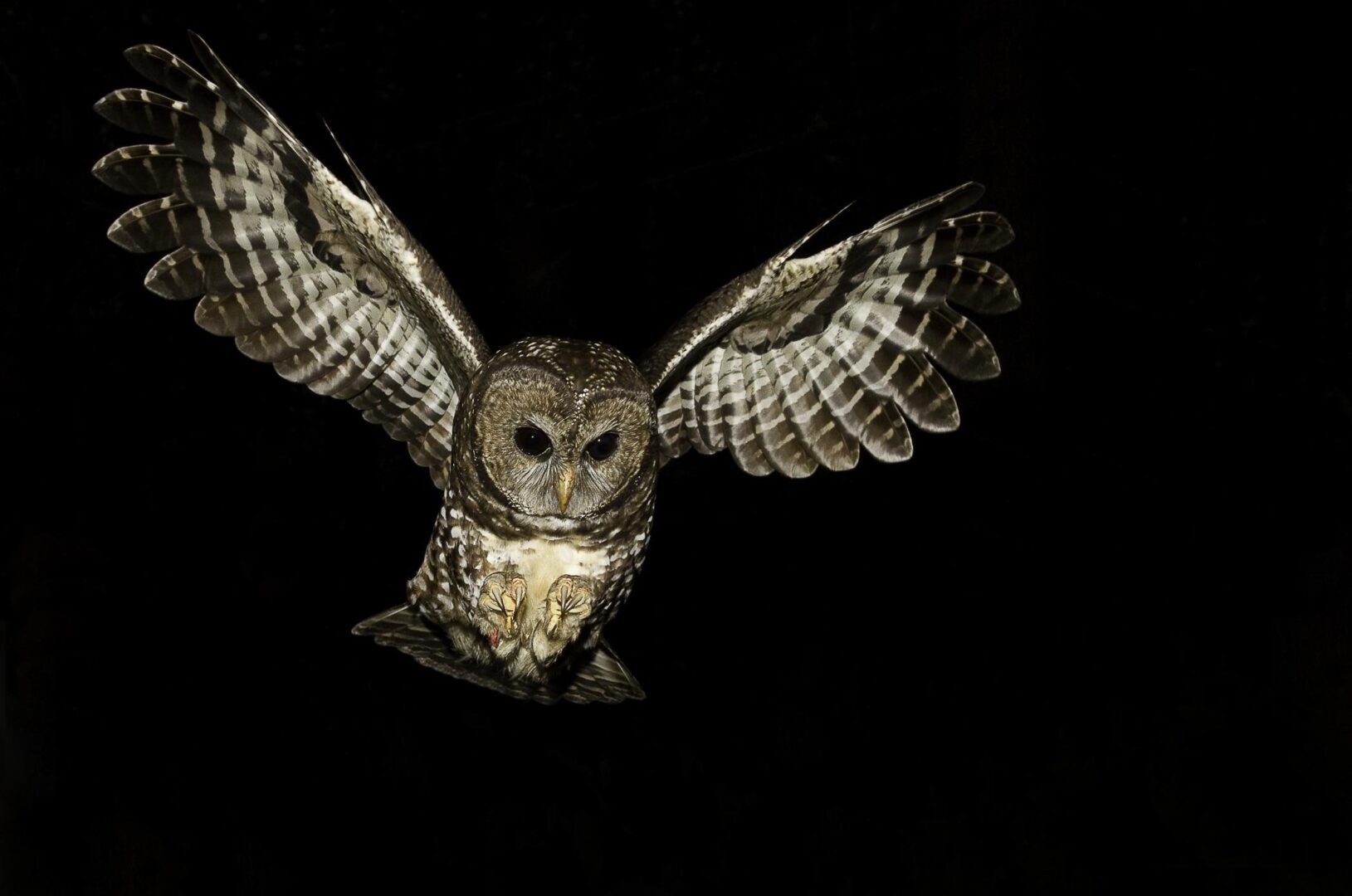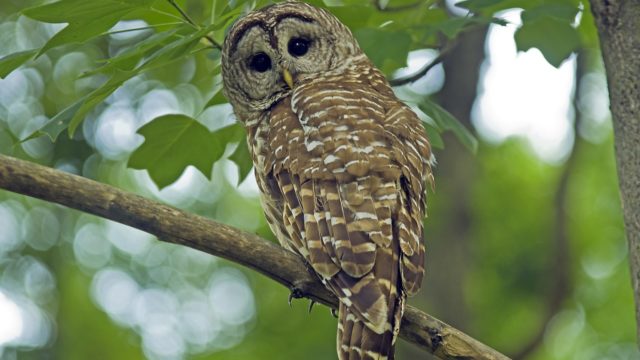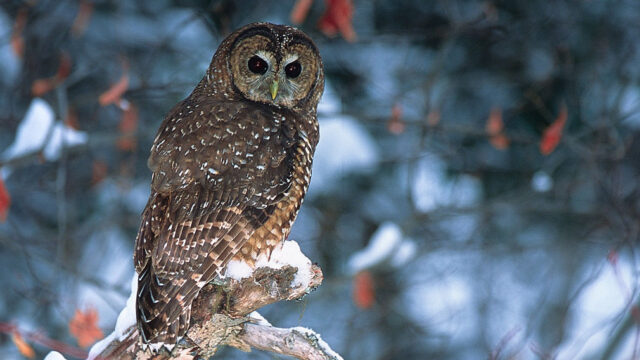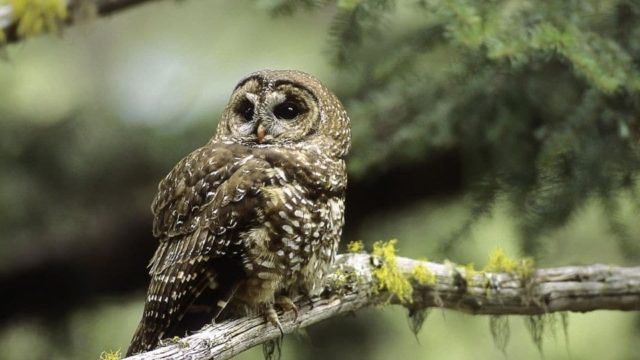Precedent-setting decision an outcome of 25-year struggle by conservation groups to save the Spotted Owl from extirpation in Canada
VANCOUVER / UNCEDED xʷməθkʷəy̓əm, Sḵwx̱wú7mesh AND səlilwətaɬ TERRITORIES — The Wilderness Committee, represented by environmental law charity Ecojustice, is celebrating a historic and critical win for the Spotted Owl and all at-risk species. On June 7, Honourable Justice Roy ruled that federal Environment Minister Steven Guilbeault’s eight-month delay before recommending an emergency order for the Spotted Owl violated the federal Species at Risk Act (SARA).
In January 2023, Minister Guilbeault determined the Spotted Owl faced imminent threats to its recovery primarily due to logging throughout its critical habitat. Under SARA, the Minister was then required to act urgently and recommend an emergency order to Cabinet to protect the Spotted Owl’s old-growth habitat from this logging. Instead, the Minister waited eight months before finally recommending that Cabinet take the emergency action required. Lawyers for the Wilderness Committee argued this delay was unlawful under SARA.
“The Minister’s delay was dead wrong. We knew that. And the court agreed,” said Wilderness Committee Protected Areas Campaigner Joe Foy. “With only three spotted owls left in the wild, the Minister had an obligation to sound the alarm to cabinet and not wait around eight months to do that.”
In his ruling, Justice Roy concurred. “I find it difficult to fathom how a period of more than eight months could be reasonable once the opinion has been formed that there exist imminent threats to the species’ survival or recovery. Either the threats are imminent or not. Either the threats concern the survival or recovery of the species or they do not. Once the opinion that the threats are about to happen, the Act says that the recommendation must be made. There is [an] emergency. The opinion triggers the action that must be taken.”
B.C. is home to the most biodiversity in all of Canada. It’s also home to more species at risk than any other province or territory, with more than 1,900 species, sub-species and ecosystems officially at risk of extinction. Much of this risk is spurred by logging and other industrial threats to the critical habitat of species that must be protected to ensure their survival and recovery.
This decision ensures the Ministers responsible for species at risk must recommend an emergency order to Cabinet within a timeline that is responsive to the nature and severity of the threat. Ministers will not be able to delay making an emergency order recommendation to further negotiate with provinces, for example, if that delay means the imminent threats to the species will have occurred before the recommendation is made.
“This is an important decision for at-risk species across the country facing imminent threats to their survival and recovery. Ministers must act with urgency. No longer can they rely on extraneous considerations and processes, like negotiating with the province, to justify delay,” said Ecojustice Lawyer Kegan Pepper-Smith. “As Justice Roy found, ‘it is not for the legal obligation to adjust to some process. The tail cannot be wagging the dog.’”
Just prior to the hearing last fall, the Minister finally made the emergency order recommendation to the federal cabinet, but it ultimately refused to make the order. Justice Roy’s decision is therefore bittersweet as it doesn’t stop active logging in spotted owl critical habitat nor prevent the B.C. government from continuing to issue logging licences.
“When you determine there’s an imminent threat, it leaves no doubt what you’re looking at. The government has to realize when they use that term about a species, it has to put a full stop on everything that is threatening it,” said Spô’zêm First Nation Chief James Hobart. “First Nations have been doing all the work while the federal and provincial governments have paused, second-guessed and minimized our efforts around something that is incredibly sacred to us.”
While this decision will not immediately help address the threat of logging still jeopardizing the Spotted Owl’s critical habitat and recovery, it will serve as a useful precedent for all at-risk species, such as the Southern Resident Killer Whales, which also face imminent threats to their habitat and survival.
Background:
Before industrial logging in British Columbia, there were an estimated 500 pairs of Spotted Owls living in the old-growth forests of southwest B.C. Today, there is only one wild-born owl left in the wild in Canada.
This dramatic decline led Ecojustice lawyers to send a letter on behalf of Wilderness Committee to the federal Minister of Environment and Climate Change in October 2020, demanding he recommend emergency order protections for the habitat of the last wild-born owls in the Spuzzum watershed to Cabinet under the Species at Risk Act. The letter argued that decades of provincial mismanagement had left Spotted Owls without legal protection and decimated the old-growth forests where they once lived.
In February 2021, thanks to the leadership of the Spo’zem First Nation and with support from Ecojustice and Wilderness Committee, the provincial government announced a one-year halt to all logging within the Spuzzum and Utzlius watersheds. These watersheds are home to the last remaining Spotted Owl in Canada. The provincial government extended the logging deferrals in these watersheds to February 2025.
Despite the temporary protection of these two watersheds, logging of Spotted Owl habitat continues outside these areas and jeopardizes the recovery of the species. Recovery of the species requires habitat to be protected so owls have a place to live when they migrate or are released from the captive breeding program currently operated by the provincial government.
That is why in October 2022, Ecojustice lawyers, on behalf of the Wilderness Committee, once again petitioned the federal Minister to fulfill his legal responsibility to protect this species and their habitat by recommending an emergency order to cabinet to protect the habitat necessary for the Spotted Owl to survive and recover. This habitat is threatened by hundreds of approved and proposed logging cutblocks.
In response to this petition, Minister Guilbeault concluded that there were imminent threats to Spotted Owl survival and recovery in January 2023. After he delayed making a recommendation to Cabinet for an emergency order, Wilderness Committee launched this case in June 2023.
About
The Wilderness Committee works to protect life-giving biological diversity through strategic research, community mobilizing, and grassroots public education. Their offices are in Vancouver, Victoria, Winnipeg and Toronto, with supporters, volunteers and activists from coast to coast to coast. They take action to protect nature, defend wildlife and fight for a stable and healthy climate.
Ecojustice uses the power of the law to defend nature, combat climate change and fight for a healthy environment. Its strategic, public interest lawsuits and advocacy lead to precedent-setting court decisions, law and policy that deliver lasting solutions to Canada’s most urgent environmental problems. As Canada’s largest environmental law charity, Ecojustice operates offices in Vancouver, Calgary, Toronto, Ottawa and Halifax.




